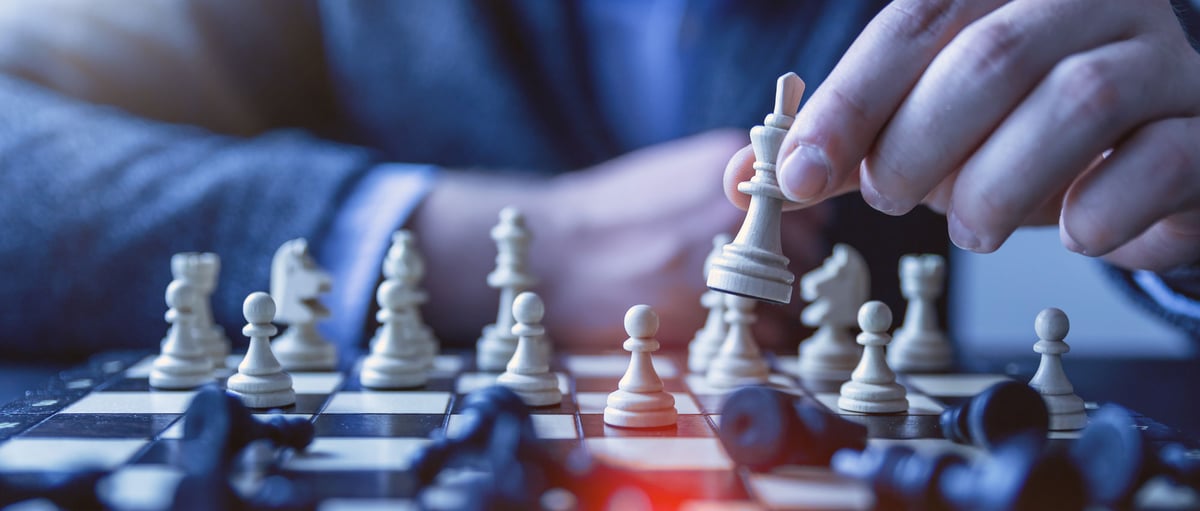
This is the first of a series of articles about the The Art of Social Marketing Strategy, a text composed of five chapters, each of which is devoted to one aspect of warfare marketing strategy. You are encouraged to take it as the definitive work on marketing strategy and tactics. But be warned: it will have an influence on marketing thinking, business tactics and beyond.
Part 1 – The Challenge
Part 2 – The Calculations: Setting Measurable Goals
Part 3 – The Plan of Attack
Part 4 – Choosing the Right Channel"The greatest victory is that which requires no battle."
--Sun Tzu, The Art of War
Disclaimer: This is not an ancient military treatise dating from the 5th century BC. This will not be attributed to an ancient military strategist.
“Thus we may know that there are five essentials for victory:
1 He will win who knows when to fight and when not to fight.
2 He will win who knows how to handle both superior and inferior forces.
3 He will win whose army is animated by the same spirit throughout all its ranks.
4 He will win who, prepared himself, waits to take the enemy unprepared.
5 He will win who has military capacity and is not interfered with by the sovereign.”
“In the midst of chaos, there is also opportunity.”
Long gone are the days when social media was optional. In this digital age of ours, your social media profiles are your digital business cards. Unlike your physical ones, social has a wider reach and a lot more influence. But you know this already or you wouldn’t be reading this post.
When done right, social media marketing is cost-effective way to increase brand awareness, expand reach and amplify your audience. It is arguably the cheaper lead generation strategy.
Why do you need social media?
Here is the one thing your parents were wrong about: just because everyone else is doing it, it does mean you should do it too. You know the reasons: engagement, influence, lead generation. You think your industry is boring? We got you covered in the post Coffee and Content Marketing for Dull Industries. Gone are the days when social media was optional. In this digital age of ours, your social media profile is a big part of your digital marketing strategy.
If your business falls in the B2B category, you are probably thinking that social is a waste of time because your target audience is too busy closing sales and managing businesses to be wasting time online. Consider this: social impacts your organic search presence. Your visibility depends on the social media activity surrounding your content, website, brand name. The more people “recommend” your content, the more visible the spot you will get in the search results page.
Staying active on social media will improve your reputation and will make brand management easier: you won’t need to check forums and “listen” online for customers’ opinions. They will be addressing them directly to you. Plus, think about the user-generated content that will keep your social profile fresh without you having to fret over it.
Social is also useful when it comes to communications. You can easily connect with other relevant businesses, find other experts, find events you can participate in, find sponsors. You will also have the opportunity to connect with other companies’ customers. Interact, connect, build relationships. Being visible means exposure to a new audience with new opportunities. Even if you are skeptical about generating leads through social, you shouldn’t underestimate how a campaign on social can support and boost your other marketing activities. Furthermore, the term “target audience” is overrated. You are in this business for the long-run. People change their likes, careers, hobbies. If you get their attention with quality content, they will refer to you when they need you.
You also need to be on social media now, because the longer you wait, the more challenging the naming task becomes. Even if your organization is not ready for full-front social, securing names and URLs will save you a lot of time (and the use of numbers and signs) in the future.
How to find time for social media?
“Great results, can be achieved with small forces.”
If you are a marketing one-man-show, social media is the last thing on your daily agenda. Finding time for it can be a challenge. Here are a few ways you can make your life easier:
- Keep your posts short and to the point: your audience will appreciate it.
- Have a plan: schedule a specific time of the day for social media. It can be a fifteen-minute interval, but dedicate it exclusively to social. Determine how much time you will spend on a given platform and commit to that.
- Don’t be all over the place: pick the most suitable platform (or two) for your business and focus. You don’t need to be omnipresent.
- Use tools and automation to make your job easier: we marketers have it easy these days with the variety of tools available. Use something to remember your passwords, to schedule your posts, to “listen” online for you. We will get into more details on the tools later, we promise.
- Use your time wisely: why not check LinkedIn while waiting? Or tweet something while traveling? You said in your CV you are good at multitasking. Now is your chance to prove it.
- You are not alone! Keep in mind everyone is struggling to find time. If your organisation’s social media demands are high, consider hiring an intern or a full-time employee. Don’t just randomly assign the task to someone whose job description uses the word “social” only as a character description.
How to find the right people for social media?
You can spend your whole life looking for the right one. Only to realize there is more than one right person for you. Especially when it comes to social media. Here are some pointers.
- Ask the right questions: don’t go with the standard “where do you see yourself in 5 years?” Ask about real situations that needed handling; about moments of difficulty and triumph. Play out different scenarios. Just because someone has “communication skills” listed in their CV, it doesn’t mean they can handle social media.
- Focus on the potential, not so much on the experience. Especially when it comes to age, numbers are irrelevant. Sometimes the best thing to do is hire someone with zero experience. The strong desire to learn and be proactive will be more useful than a know-it-all with a lack of enthusiasm to do. Hire the person who is curious.
- Do check their social media profiles. Don’t expect huge numbers: if they are busy making companies social media influencers, they might be less engaged with their own profiles. But check if they have profiles, how often they update the content, what they are sharing, Disclaimer: we don’t encourage stalking people on Facebook. You risk asking them to explain to you that profile picture at the top of the mountain with a huge stuffed giraffe.
- Make sure the personality fits the job and the company. If someone seems right for the company, it doesn’t mean he or she is right for the job and vise versa.
Ok, we still can’t prove numerically how huge is the benefit for businesses to be present on social media or how much it increases sales. But we all know that being absent is not an option. Embrace the chaos, use the appropriate hashtag and tweet away.
Ready for the next chapter? The Calculations will be out next week.


